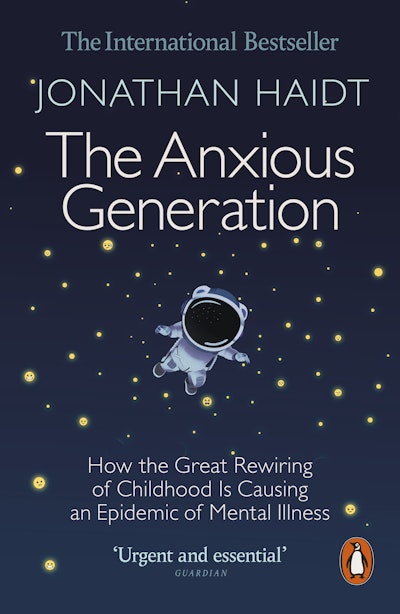- Published: 25 March 2025
- ISBN: 9781802063271
- Imprint: Penguin Press
- Format: Paperback
- Pages: 464
- RRP: $30.00
The Anxious Generation
How the Great Rewiring of Childhood Is Causing an Epidemic of Mental Illness
Extract
When I talk with parents of adolescents, the conversation often turns to smartphones, social media, and video games. The stories parents tell me tend to fall into a few common patterns. One is the “constant conflict” story: Parents try to lay down rules and enforce limits, but there are just so many devices, so many arguments about why a rule needs to be relaxed, and so many ways around the rules, that family life has come to be dominated by disagreements about technology. Maintaining family rituals and basic human connections can feel like resisting an ever-rising tide, one that engulfs parents as well as children.
For most of the parents I talk to, their stories don’t center on any diagnosed mental illness. Instead, there is an underlying worry that something unnatural is going on, and that their children are missing something—really, almost everything—as their online hours accumulate. But sometimes the stories parents tell me are darker. Parents feel that they have lost their child. A mother I spoke with in Boston told me about the efforts she and her husband had made to keep their fourteen-year-old daughter, Emily, away from Instagram. They could see the damaging effects it was having on her. To curb her access, they tried various programs to monitor and limit the apps on her phone. However, family life devolved into a constant struggle in which Emily eventually found ways around the restrictions. In one distressing episode, she got into her mother’s phone, disabled the monitoring software, and threatened to kill herself if her parents reinstalled it. Her mother told me:
It feels like the only way to remove social media and the smartphone from her life is to move to a deserted island. She attended summer camp for six weeks each summer where no phones were permitted—no electronics at all. Whenever we picked her up from camp she was her normal self. But as soon as she started using her phone again it was back to the same agitation and glumness. Last year I took her phone away for two months and gave her a flip phone and she returned to her normal self.
When I hear such stories about boys, they usually involve video games (and sometimes pornography) rather than social media, particularly when a boy makes the transition from being a casual gamer to a heavy gamer. I met a carpenter who told me about his 14-year-old son, James, who has mild autism. James had been making good progress in school before COVID arrived, and also in the martial art of judo. But once schools were shut down, when James was eleven, his parents bought him a PlayStation, because they had to find something for him to do at home.
At first it improved James’s life—he really enjoyed the games and social connections. But as he started playing Fortnite for lengthening periods of time, his behavior began to change. “That’s when all the depression, anger, and laziness came out. That’s when he started snapping at us,” the father told me. To address James’s sudden change in behavior, he and his wife took all of his electronics away. When they did this, James showed withdrawal symptoms, including irritability and aggressiveness, and he refused to come out of his room. Although the intensity of his symptoms lessened after a few days, his parents still felt trapped: “We tried to limit his use, but he doesn’t have any friends, other than those he communicates with online, so how much can we cut him off?”
No matter the pattern or severity of their story, what is common among parents is the feeling that they are trapped and powerless. Most parents don’t want their children to have a phone-based childhood, but somehow the world has reconfigured itself so that any parent who resists is condemning their children to social isolation. In the rest of this chapter, I’m going to show you evidence that something big is happening, something changed in the lives of young people in the early 2010s that made their mental health plunge. But before we immerse ourselves in the data, I wanted to share with you the voices of parents who feel that their children were in some sense swept away, and who are now struggling to get them back.
The Anxious Generation Jonathan Haidt
A powerful argument for reclaiming childhood - and all human relationships - from the online world, from the influential social psychologist and international bestselling author
Buy now











